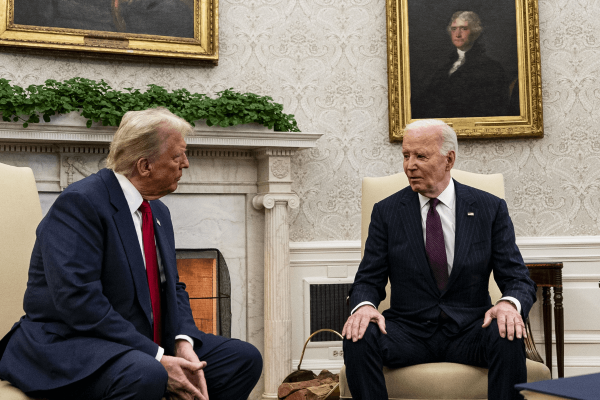Two years ago, Sojourners magazine released our February 2018 cover story, asking the question, “Is This a Bonhoeffer Moment?” This week, the board of directors of the International Bonhoeffer Society — an organization dedicated to research and scholarship on the life and writings of Dietrich Bonhoeffer — issued an answer from their discernment.
Here is how the statement, obtained exclusively by Sojourners, begins:
As grateful recipients, and now custodians, of the theological, ethical, and political legacy of the German pastor-theologian and Nazi resister Dietrich Bonhoeffer, we believe all persons of faith and conscience should prayerfully consider whether our democracy can endure a second term under the presidency of Donald Trump. We believe it cannot. In 2017, we issued a statement expressing our grave concerns about the rise in hateful rhetoric and violence, the rise in deep divisions and distrust in our country, and the weakening of respectful public discourse ushered in by the election of Donald Trump. We articulated the need for Christians to engage in honest and courageous theological reflection in the face of the threat posed by his leadership. Over the last three years, the need for such discernment has grown more urgent.
The statement starts where any Christian statement in a time like this should — by evaluating a political regime by the standards of the gospel — how their governance affects those on the margins of society. They say:
A hallmark of Dietrich Bonhoeffer’s legacy is his insistence that we see the great events of world history from “the view from below” (1942). That is, he urges us to see from the perspective of those who suffer. The policies of the Trump administration both threaten and disempower the most vulnerable members of our society, including people of color, members of the LGBTQ communities, Muslims and other religious minorities, immigrants, refugees, the poor, the marginally employed, and the unemployed. Moreover, Donald Trump has now taken ill-advised military action that raises the specter of war. One of the greatest lessons learned from the history of the Christian churches during Germany’s Third Reich is that it is crucial to respond to threats to human life, integrity, and community when they first appear, and to continue to challenge them.
The signers of this statement are not megachurch pastors, powerful leaders of religious institutions, or influential figures to whom the media typically pays attention. Rather they identify themselves, “As Bonhoeffer scholars, religious leaders, and confessing Christians,” who have “a special responsibility to name crises and discern responsible actions of resistance and healing.”
And this is the significant and sobering conclusion the Bonhoeffer Society leaders have reached:
We believe that one crucial step in this reckoning is ending Donald Trump’s presidency. We do not make this statement lightly. Bonhoeffer’s writings have been influential for Christians from a wide range of churches and political views, but we feel called to address the grave moral concerns we have outlined here that call every one of us to account. During this new year, debates and discussion will continue to be held concerning the best way for America to move forward. We believe that the United States has the human resources to provide capable and willing leaders, and that together a more just and respectful future can be forged. Acknowledging that all human community and leadership is a mixture of blessing and brokenness, health and dysfunction, we stand with all those who believe this country deserves and needs a constitutional and peaceful change in leadership. And we commit ourselves to listen to the call and obey the commands of Jesus as we enter the year 2020.
My position on the presidency of Donald Trump continues to be that the issues involved take us deeper than legitimate political differences or partisan divides. The issues that the corrupt and immoral leadership of the president has raised are deeply theological and Christological. They are not just differences in political ideology; rather, they are matters of blasphemy and heresy.
A example of the theological offenses committed by President Trump and his white evangelical supporters came at recent rally in Miami, which served as the official launch of “Evangelicals for Trump.”
At King Jesus International Ministry, several prosperity gospel pastors and leaders hosted the president for a political rally and prayed publicly on stage beforehand. After the prosperity pastors laid their hands on Trump in prayer and political support, the president of the United States openly said this: “I really do believe that God is on our side. I believe that. I believe that ... or there would have been no way we could have won, right? People said, how do you win? You don't have the media, you have so many things against you, and we win. So, there has to be something, has to be something."
Apparently, Trump does believe that. And, apparently, so do the “leaders” who were with Trump on stage or are part of the new evangelical coalition.
It is blasphemy for Donald Trump — or any political leader — to suggest that God is on his side or favors his candidacy or political party. That blasphemy must be named for what it is. To imply that Trump won his election because of divine intervention — as some of his court evangelicals have said — is to essentially bestow on Trump the divine right of kings, an idea that is antithetical to the principles upon which the United States was founded and to the gospel of Jesus Christ. It also shows again that Trump thinks of himself as a monarch, as so many of his words and actions prove.
Abraham Lincoln spoke words of wisdom that are as timely today as they have ever been: "Sir, my concern is not whether God is on our side; my greatest concern is to be on God's side, for God is always right." Donald Trump and his supporters would like to believe that God is on his (or their) side. But every one of them must now ask, "Are we on God's side?” Are Trump’s statements and policies of racial bigotry and division on God’s side? Are his policies that dehumanize immigrants and separate migrant families at the border on God’s side? Is Trump’s lifelong demeaning, exploiting, and betrayal of women, including his own three wives, on God’s side?
How about his persistent and pathological lying, or using foreign leaders to assist his elections, or blocking other branches of government, thus undermining democracy? Are those behaviors all on God’s side? We must ask Trump’s uncritical “chaplains” whether they support Trump’s blasphemy of saying that God is on his side, or do they have the courage to engage in a public debate with other Christian leaders about the proper relationship of faith and politics in this presidential election campaign.
In the same Miami speech, Trump said: "This election is about the survival of our nation. With your help, your prayers, and your tireless effort to mobilize Christian communities across our land, on Nov. 3, 2020 ... We're going to win another monumental victory for faith and family, God and country, flag and freedom."
It is very alarming to hear Donald Trump speak of his re-election in the absolutist terms of national survival when so many of us firmly believe that his conduct as a candidate, and now as president, undermines the nation's survival as a representative democracy. It's also blasphemous to equate his victory in an election with a victory for God. God's reign and God's kingdom do not depend on the political fortunes of any human being, period.
A friend recently recommended to me a new book by Mary M. Solberg called A Church Undone: Documents from the German Christian Faith Movement 1932-1940. In its pages, Solberg has translated (in some cases for the first time) primary sources that reveal how pro-Nazi Protestants in Germany at the time — they called themselves “German Christians” — talked about Adolf Hitler and Nazism. In reviewing how these Nazis and Nazi sympathizers, who called themselves Christian, spoke of Hitler and his place in history, it was impossible to escape how it compares to some of the most servile white evangelical boosters for Donald Trump.
Here’s a sample of what pro-Nazi Protestants wrote at the time:
“God fashioned for himself a man … and gave him the greatest mission in our history: to pull the German people up out of despair and to restore their faith in life” (147); “… Adolf Hitler, with his faith in Germany, as the instrument of our God became the framer of German destiny and the liberator of our people from their spiritual misery and division” (197) …“in the person of the Führer we see the one God has sent, who sets Germany before the Lord of history ...” (346); “… in the pitch-black night of Christian church history, Hitler became like a wonderful transparency for our time, a window through which light fell upon the history of Christianity” (347); “…the Third Reich has grasped the German mission that God has set before us” (373)
Compare this with some of the things we routinely hear from right-wing white evangelical leaders about Donald Trump.
- David Lane, an evangelical leader who organizes pastors, told the Washington Post, “For whatever reason, in my opinion, God raised Donald Trump. Everything he said he’s going to do, he’s done from an evangelical standpoint. None of the other candidates in 2016 would have done what Donald Trump has done.”
- Matt Moore, a former chairman of the South Carolina Republican Party, explained it like this: “A lot of evangelicals believe the current culture war is a zero sum game and their side has to win … They see Trump as sort of a Moses figure who is leading them out of the wilderness.”
- Former Texas Gov. Rick Perry said in a Fox News interview that he told Trump he was the “chosen one.”
- Franklin Graham has suggested Trump’s 2016 victory showed “God’s hand was at work.”
- Ralph Reed is set to release a book in April called For God and Country: The Christian Case for Trump. The book's original title was reportedly Render to God and Trump.
- Robert Jeffress, one of the fiercest and most unequivocal defenders of President Trump, said in 2016: “Mr. Trump, I believe you’re going to be the next president of the United States. And if that happens, it’s because God has a great purpose for you and for our nation.” Jeffress even went so far as to bring a 200-person choir and orchestra to Washington, D.C., to perform a hymn called “Make America Great Again.”
What we are facing now in America is a faith emergency, and that is how we must now respond to it. In their statement, the Bonhoeffer Society board offers the following theological lessons from Dietrich Bonhoeffer that resonate in these times:
- He spoke of God’s freedom and human freedom as “freedom for others” not “freedom from others.” (1932)
- He preached that the gospel is “the good news of the dawning of the new world, the new order … God’s order,” and therefore it is good news for the poor. (1932)
- He warned that leaders become “misleaders” when they are interested only in their own power and neglect their responsibilities to serve those whom they govern. (1933)
- He warned that when a government persecutes its minorities, it has ceased to govern legitimately. (1933)
- He reminded Christians that the church has an “unconditional obligation toward the victims of any societal order, even if they do not belong to the Christian community.” (1933)
- He wrote, “For peace must be dared. It is the great venture. … The hour is late. The world is choking with weapons. … The trumpets of war may blow tomorrow. For what are we waiting?” (1934)
- He believed that Jesus’s commands in the Gospels - like love your neighbor as you love yourself, welcome the stranger, and love your enemies - are to be obeyed in the social and political realm. He wrote: “From the human point of view there are countless possibilities of understanding and interpreting the Sermon on the Mount. Jesus knows only one possibility: simply go and obey.” (1936)
- He wrote, “Behold God become human … God loves human beings. …Not an ideal human, but human beings as they are. … What we find repulsive … namely, real human beings … this is for God the ground of unfathomable love.” (1941)
- He wrote from prison, “… one only learns to have faith by living in the full this-worldliness of life. ...then one takes seriously no longer one’s own sufferings but rather the suffering of God in the world. Then one stays awake with Christ in Gethsemane. And I think this is faith; this is [metanoia/repentance]. And this is how one becomes a human being, a Christian. ... How should one become arrogant over successes or shaken by one’s failures when one shares in God’s suffering in the life of this world?” (1944)
- He wrote from prison, “How do we go about being ‘religionless-worldly’ Christians, how can we be [ecclesia/church], those who are called out, without understanding ourselves religiously as privileged, but instead seeing ourselves as belonging wholly to the world?” (1944)
Got something to say about what you're reading? We value your feedback!







